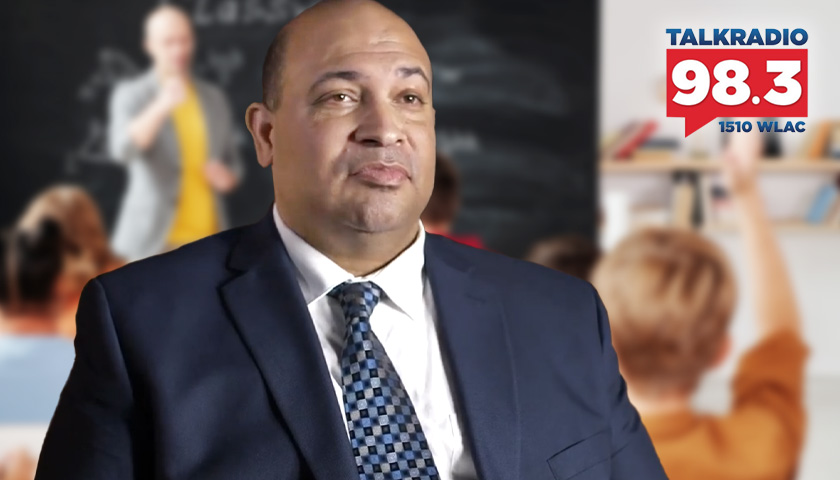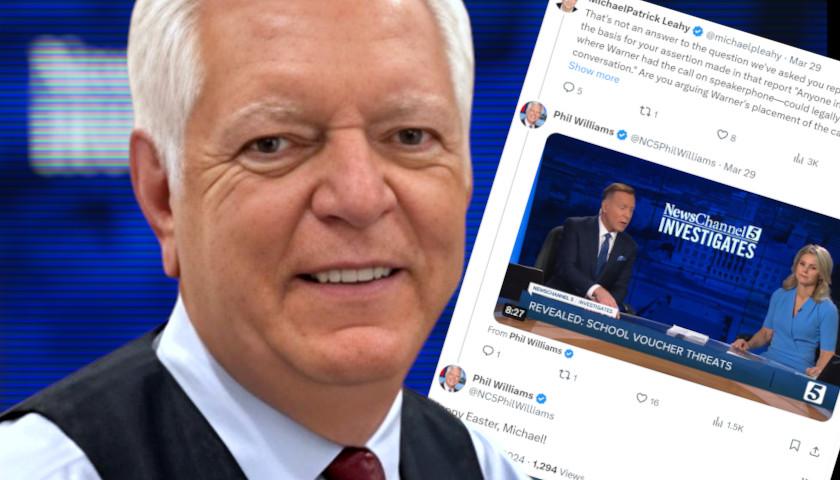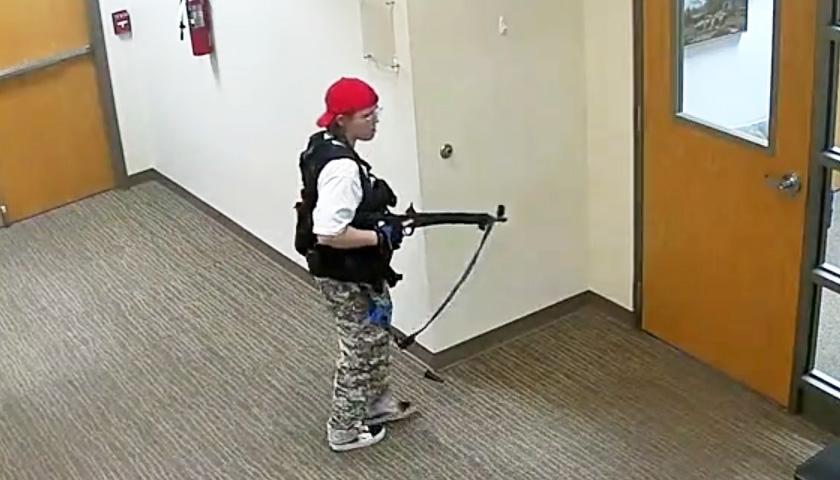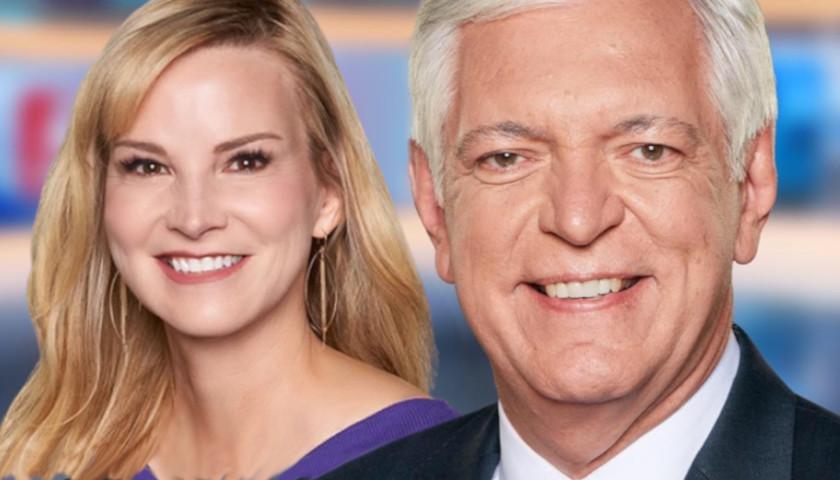Live from Music Row Friday morning on The Tennessee Star Report with Michael Patrick Leahy – broadcast on Nashville’s Talk Radio 98.3 and 1510 WLAC weekdays from 5:00 a.m. to 8:00 a.m. – host Leahy welcomed Principal Phil Schwenk of American Classical Academy in studio to explain the curriculum of classical education.
Leahy: In studio, Phil Schwenk, the principal of American Classical Academy of a public charter school, is soon to come here to Tennessee. Now, Phil, talking a little bit about your background. A graduate University of Pennsylvania, you taught in public schools for 16 years in LA.
Became involved in charter schools, and for the past three plus years, you’ve been the principal of a public charter school in Toledo, Ohio. Tell us how you started that and tell us what launching that has been like.
Schwenk: Sure. That whole process started in 2019. It was a wonderful process. And that is the easiest way to put it. A lot of work. But what I was part of was starting a Barney Charter School Initiative school in Toledo, which is a public charter that was available to any student in Toledo that wanted to be part of classical education.
In this school, we use what’s called the program guide, which is the curriculum, the K-12 curriculum from Hillsdale, and we have the support of Hillsdale as far as professional development.
Other than that, it’s a regular charter school sponsored by the state of Ohio. And we started as a K-8. It’s now a K-11. We start with 185 kids. There are now over 500 kids.
Leahy: And apparently, the test results have been very good.
Schwenk: Very much so. Yeah.
Leahy: Congratulations on doing a great job with kids!
Schwenk: Yes, well, I was actually ranked the number one charter school in Toledo. Well, there you go. By the people there.
Leahy: There you go. Now, here in Tennessee, there’s a state law that allows public charter schools.
Schwenk: Yes.
Leahy: Tell our audience, what’s the difference between a public charter school and a government-run regular school for K12.
Schwenk: Okay. For K-12, let’s start with the word public. I think it’s actually important. It’s a public school, meaning it’s free to those participating. Any student can come, the doors are open to any student that would like to participate in our curriculum.
At a charter school, I think another word that we often use is community. It’s a school that has been asked for by people in that community. It’s parents saying, hey, I’d like to have an option.
Charter schools are kind of a different angle on education that a parent wants to be part of. In our case, it’s about classical education.
Leahy: So you’ve been recruited by American Classical Education. They’re affiliated with Hillsdale, but they’re separate and independent. They want to start at least three public charter schools here in Tennessee, in Montgomery County, Clarksville, Rutherford County, and then in Jackson-Madison County. That’s correct.
The process here is if you have a public charter school, you put an application to the school board. Most of the time, they turn all those down because they don’t want any competition, basically.
Schwenk: Yes, that’s true.
Leahy: And in this case, that’s what happened with your applications in all these three counties. And now there’s a process where you can appeal those denials before the Tennessee Public Charter School Commission.
Schwenk: That’s true.
Leahy: Hearings were held last week, and you went up and testified in those hearings.
Schwenk: Yes.
Leahy: So you’re a black guy, right?
Schwenk: I am, yes.
Leahy: You’ve been a teacher for a long time.
Schwenk: I am.
Leahy: You go to do the hearings and then let’s just describe it. Let’s be honest. These are my words. An angry white guy who’s a left-wing liberal that works for News Channel 5, Phil Williams, is deciding to dishonestly represent what you’re teaching in these public charter schools.
Schwenk: Absolutely.
Leahy: So he comes up to you, a black guy, and in essence, he says, because the president of Hillsdale, who’s not running these schools, Larry Arnn, said something about the teaching of race and sexuality in schools. We’re not talking about the curriculum. Wasn’t talking about being taught.
Schwenk: No.
Leahy: Phil Williams comes to you and in essence, he says, “Why are you trying to be a racist? No.”
How did he portray you?
Schwenk: He didn’t say that way, but I would suggest that’s what he’s suggesting. I mean, he’s saying that the curriculum that I’m trying to put in front of kids is promoting racist ideologies.
Leahy: Yes. And he’s the angry white guy, and you’re the black guy that’s been a teacher for years and years and years.
Schwenk: Yes.
Leahy: What’s wrong with that picture?
Schwenk: The irony is significant. Yes. Especially a person who spent most of my time working with the kids that he says that he’s trying to protect. I’ve worked with kids all over this country. Went to college in Philadelphia, Los Angeles, Cleveland, and Toledo.
Leahy: One of those public charter schools that were in the applications for American Classical Academy is in Jackson.
Schwenk: Yes.
Leahy: The city of Jackson, Madison County. There are 145 local education agencies in the state.
Schwenk: Sure.
Leahy: They’re, I think, the lowest ranked in terms of any, and they have one of the highest disadvantaged student populations. So he doesn’t want to help them very much.
Schwenk: Yes, he doesn’t want to help them.
Leahy: He doesn’t want to help them. But you want to help them. But you’re the bad guy, according to him, this angry white guy.
Schwenk: Yes.
Leahy: Tell us about the curriculum and tell us how you teach kids. I’ve read over the curriculum. I think it’s fantastic.
Schwenk: It is.
Leahy: You teach the truth about American history.
Schwenk: Absolutely.
Leahy: You talk about slavery.
Schwenk: Yes.
Leahy: You talk about the civil rights movement.
Schwenk: Absolutely.
Leahy: I saw this report from Phil Williams, and he gave you the impression that you don’t talk about those things.
Schwenk: Yes. Which is false.
Leahy: That’s a false impression. Phil Williams, you are a dishonest person! You are dishonest, and we’re going to call you out some more on this.
But go ahead and tell us about that interaction when he asked you about your curriculum. I think he was kind of like a condescending white guy, frankly, to you. (Schwenk laughs) That’s what it struck me as.
Schwenk: No, that’s fair. Yes. But I don’t think it really was about the curriculum. Meaning that if you understand classical education, what we’re seeking is truth and goodness and beauty. That’s the heart of classical education.
Leahy: I can tell just by your demeanor that you’re an honest guy. You do seek truth.
Schwenk: I do. Absolutely.
Leahy: See, this is the difference between you and me. I got some hard edges. I don’t mind punching a bad guy in the nose. Go ahead.
Schwenk: Well, I do my work because I love kids and I love truth, and I want to introduce the two of them. And our hope in a classical school is that the kids come out and that they’re good.
And to do that, you have to teach kids how to seek truth. And there’s no way that you can study American history without recognizing race or the part of civil rights. Of course, we talk about those things, so let’s just be honest about it.
Leahy: The way Phil Williams presented how you’re going to teach was utterly dishonest.
Schwenk: Yes.
Leahy: I mean, he tried to imply that you’re not going to talk about race at all. Well, that’s just ridiculous.
Schwenk: Our hope, I mean, in our country, that’s what makes our country great is the moral backing that it started with. We hold these truths to be self-evident, that all men are created equal. That was our moral standing from the beginning, and we’ve been fighting about it for a couple of hundred years.
And I would argue an effective job. Are we entirely done? Well, no, but we’ve done a very good job, and we’ve desired to be good. And if I’m training kids to be good, of course, they would see slavery and racism as evil institutions, because they are.
So I don’t know why it would be that we can’t talk about it. I think the difference is that we’re not just sitting there and doing entire units on race and trying to tell people what they should think about these things.
We’re talking about our history, the fact something that we can look back on, actually have facts that we can look at, look at primary documents and have conversations about these things. And that’s everything. The institution of slavery.
We have to talk about what it was, what it is, and why it’s evil. We have to talk about how our country had to move to this place where we could have increased freedoms for its citizens, which is what we’re trying to do.
We’re trying to create free thinkers in a free society. That’s what we’re doing. That’s the basis of our work. And a person to do that has to be learning. They have to be able to read and write effectively. They have to be able to speak effectively.
They have to be able to reason and logic. And at the heart of that, there should be a good and moral and decent person who seeks to be virtuous and a participant in this country of ours, a country that we’re suggesting is a great country.
It’s a country that has good moral foundations. We don’t see ourselves as perfect. Frankly, none of us are. That’s part of what we teach kids is about our human nature, like who we are and why you have to set up a government recognizing how we are as individuals and human beings, that while we are able to do very good things, we can do some pretty evil things as well. History allows us to study that.
Listen to today’s show highlights, including this interview:
– – –
Tune in weekdays from 5:00 – 8:00 a.m. to The Tennessee Star Report with Michael Patrick Leahy on Talk Radio 98.3 FM WLAC 1510. Listen online at iHeart Radio.
Photo “Phil Schwenk” by Northwest Ohio Classical Academy. Background Photo “Teacher and Students” by Max Fischer.
[Editor’s Note: American Classical Education is an advertiser in The Tennessee Star.]









Cronilogical
Warts and all
Is the only fair method
Separating history by race or gender cannot possibly relate context there by learning from our past.
A little reading will show LBJ only signed early republican bills re civil rights to get funding for his “Great Society”
Another one of those paths of least resistance the Republicans should hv howled about
Which is still causing untold havoc and heartbreak
If I remember correctly the first republican civil rights bill was a small step forward, 1947 signed by Eisenhower
All this is well and good if history is presented truthfully and accurately. Balance is the key, so the question is “is there balance in the American Classical Academy curriculum”? No way of knowing from this dialogue.